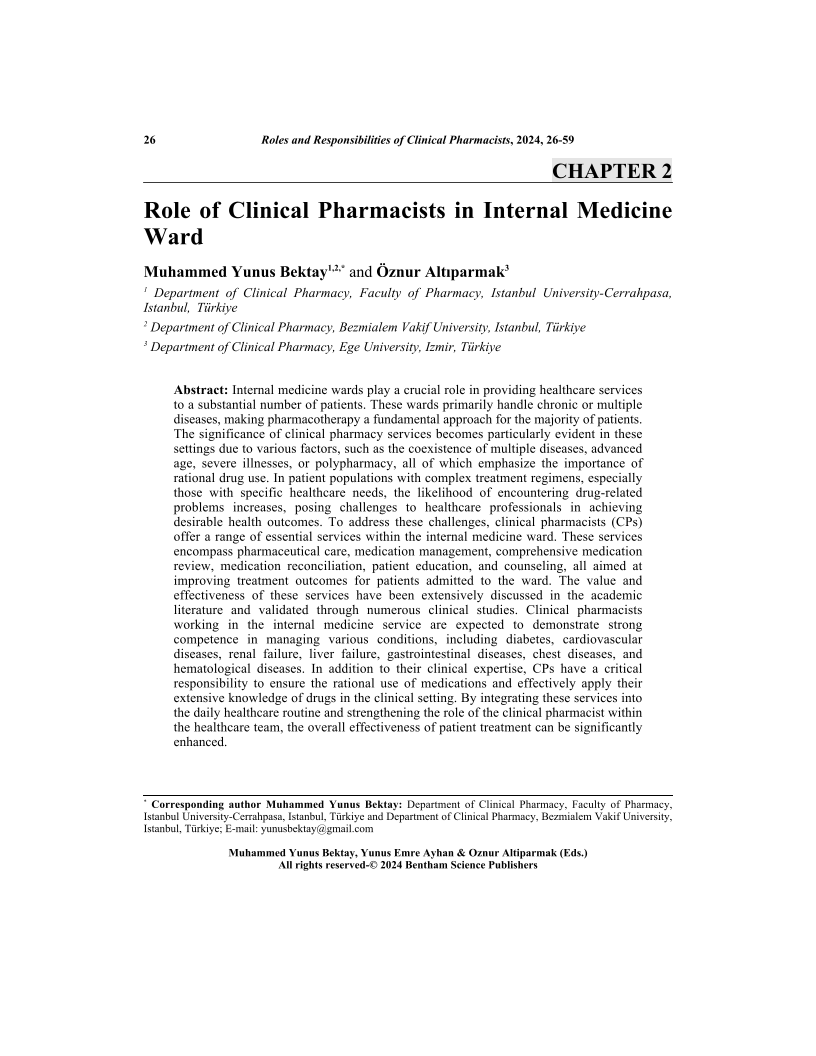Role of Clinical Pharmacists in Internal Medicine Ward

- Authors: Muhammed Yunus Bektay1, znur Altıparmak2
-
View Affiliations Hide Affiliations1 Department of Clinical Pharmacy, Faculty of Pharmacy, Istanbul University Cerrahpasa, Istanbul, Trkiye 2 Department of Clinical Pharmacy, Ege University, Izmir, Trkiye
- Source: The Roles and Responsibilities of Clinical Pharmacists in Hospital Settings , pp 26-59
- Publication Date: September 2024
- Language: English
Role of Clinical Pharmacists in Internal Medicine Ward, Page 1 of 1
< Previous page | Next page > /docserver/preview/fulltext/9789815256741/chapter-2-1.gif
Internal medicine wards play a crucial role in providing healthcare services to a substantial number of patients. These wards primarily handle chronic or multiple diseases, making pharmacotherapy a fundamental approach for the majority of patients. The significance of clinical pharmacy services becomes particularly evident in these settings due to various factors, such as the coexistence of multiple diseases, advanced age, severe illnesses, or polypharmacy, all of which emphasize the importance of rational drug use. In patient populations with complex treatment regimens, especially those with specific healthcare needs, the likelihood of encountering drug-related problems increases, posing challenges to healthcare professionals in achieving desirable health outcomes. To address these challenges, clinical pharmacists (CPs) offer a range of essential services within the internal medicine ward. These services encompass pharmaceutical care, medication management, comprehensive medication review, medication reconciliation, patient education, and counseling, all aimed at improving treatment outcomes for patients admitted to the ward. The value and effectiveness of these services have been extensively discussed in the academic literature and validated through numerous clinical studies. Clinical pharmacists working in the internal medicine service are expected to demonstrate strong competence in managing various conditions, including diabetes, cardiovascular diseases, renal failure, liver failure, gastrointestinal diseases, chest diseases, and hematological diseases. In addition to their clinical expertise, CPs have a critical responsibility to ensure the rational use of medications and effectively apply their extensive knowledge of drugs in the clinical setting. By integrating these services into the daily healthcare routine and strengthening the role of the clinical pharmacist within the healthcare team, the overall effectiveness of patient treatment can be significantly enhanced.
-
From This Site
/content/books/9789815256741.chapter-2dcterms_subject,pub_keyword-contentType:Journal -contentType:Figure -contentType:Table -contentType:SupplementaryData105

